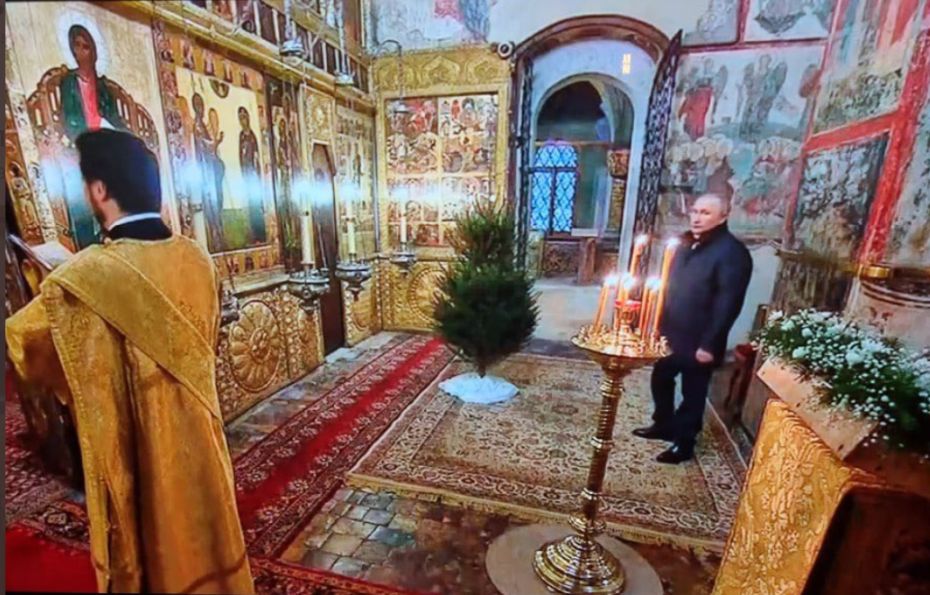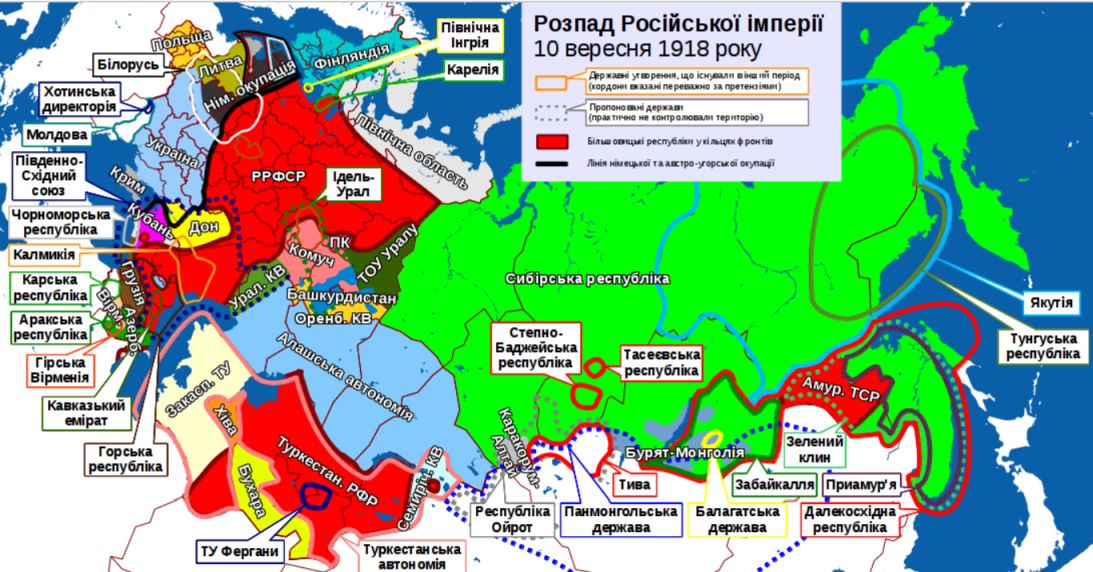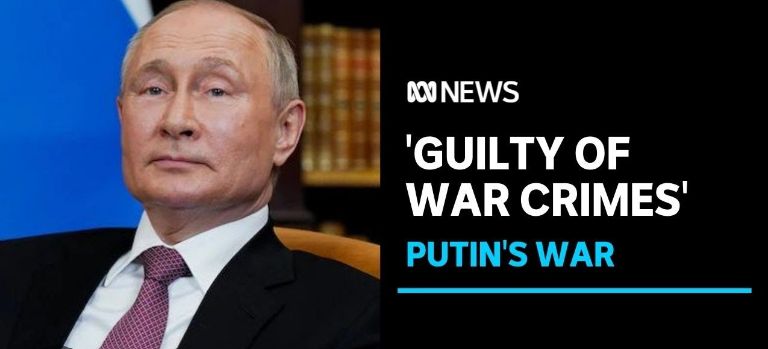By Eric Vandenbroeck
and co-workers
Why
It Is Time To Prepare For Russia’s Collapse
Since Russia’s
attempt to take Kyiv and install a puppet government failed in the early days
of the war, a defeat for the Kremlin in Ukraine
has looked increasingly likely. What’s stunning after almost a year of the
war, therefore, is the near-total absence of any discussion among politicians,
policymakers, analysts, and journalists of the consequences of defeat for
Russia. It is a dangerous lack of imagination, considering the potential for
Russia’s collapse and disintegration.
The combination of a
failed war abroad and a brittle, strained system at home increases the
likelihood of some implosion with every passing day. Whether this will be good
or bad for the West, it’s an outcome for which policymakers should prepare.

There Are Various Scenarios For What Might Happen In
Russia.
There are various
scenarios for what might happen in Russia after the defeat in Ukraine becoming
even more apparent. Most likely is Russian President Vladimir Putin’s departure
from office, followed by a vicious power struggle among the extreme right-wing
nationalists who want to continue the war effort and destroy the existing political
hierarchy, authoritarian conservatives who have a stake in the system, and a
resurgent semi-democratic movement committed to ending the war and reforming
Russia. We don’t know who has a stake in the system and a resurgent
semi-democratic movement committed to ending the war and improving Russia. We
don’t know who will win, but we can confidently predict that the power struggle
will weaken the regime and distract Russia from what remains of its war effort.
In turn, a weakened regime, in conjunction with a malfunctioning economy, will
invite disgruntled Russians to take to the streets, perhaps even with arms, and
encourage some of the non-Russian political units comprising the Russian
Federation to opt for greater self-rule; leading candidates include Tatarstan,
Bashkortostan, Chechnya, Dagestan, and Sakha. If Russia survives this turmoil,
it’s likely to become a weak client state of China. If it does not, the map of
Eurasia could look very different.
Given Russia’s vast
expanse, long history of restive regions, and large non-Russian ethnicities—all
a result of centuries of imperial conquest—the one scenario that deserves much
more attention is a disintegration of centralized control and breakup of the
federation. There is a rich history of state collapse following wars,
revolutions, system breakdowns, economic crises, and other epochal events.
Napoleon’s empire collapsed after his disastrous march on Moscow and subsequent
defeat at the Battle of Leipzig. In 1918, the Ottoman, Austro-Hungarian,
German, and Russian empires collapsed in military defeat. Of course, people,
decisions, and policies played a role. Still, ultimately it was war and the
attendant economic and social crises that pushed these states over the
edge into political chaos and often violence.
Consider, as well,
the dissolution of the Soviet Union, an outcome very few Russians wanted or
even imagined when Mikhail Gorbachev took power as Soviet Communist Party
leader in 1985. As late as early 1991, most Soviet citizens voted in a
referendum to retain their country. True, all the republics, including Russia,
declared sovereignty in 1990, and all, save Russia, declared full
independence in the aftermath of the failed hard-liner coup in 1991. But the
system collapsed primarily because Gorbachev decided to rejuvenate the Soviet
Union by dismantling its core features, totalitarianism, and central planning,
thereby setting political, social, and economic forces in motion that
ultimately compelled most of the republics to seek refuge from the chaos in autonomy
and independence. Perestroika—Gorbachev’s signature economic and political
restructuring policy—unintentionally killed the Soviet Union.
The fall of the
Berlin Wall in 1989 and the resignation of Mikhail Gorbachev as president of
the Soviet Union in 1991 marked the start of the USSR’s collapse—but not the
collapse itself. While the USSR ceased to exist as a legal entity after 1991,
the collapse of the USSR is still happening today. The two Chechen Wars,
Russia’s invasion of Georgia in 2008, Russia's annexation of Crimea in 2014,
the on-and-off border skirmishes between Kyrgyzstan and Tajikistan, and the
2020 Second Karabakh War between Armenia and Azerbaijan are just a few examples
showing that the Soviet Union is still collapsing today.
However, future
historians will likely describe Russia's February 2022 invasion of Ukraine as
the most consequential moment, if not the final moment, of the Soviet Union’s
collapse. When the war in Ukraine ends is unknown, but it will likely mark the
dissolution of the Russian Federation (the legal successor of the Soviet Union)
as it is known today. Russia has undeniably suffered a major blow to its
economy, devastation to its military capability, and degradation of its
influence in regions where it once had clout. The borders of the Russian
Federation will likely not look the same on a map in 10 or 20 years as they do
now. As the final collapse of the Soviet Union plays out and as the Russian
Federation faces the possibility of dissolving, policymakers need to start
planning for the new geopolitical reality on the Eurasian landmass.

The combination of a
failed war abroad and a brittle, strained system at home increases the
likelihood of implosion with every passing day. Whether this will be good or
bad for the West, it’s an outcome for which policymakers should prepare.
Various scenarios for
what might happen in Russia after the defeat in Ukraine become even more
apparent. Most likely is Russian President Vladimir Putin’s departure from
office, followed by a vicious power struggle among the extreme right-wing
nationalists who want to continue the war effort and destroy the existing
political hierarchy, authoritarian conservatives who have a stake in the
system, and a resurgent semi-democratic movement committed to ending the war
and reforming Russia. We don’t know who will win, but we can confidently
predict that the power struggle will weaken the regime and distract Russia from
what remains of its war effort. In turn, a weakened regime, in conjunction with
a malfunctioning economy, will invite disgruntled Russians to take to the
streets, perhaps even with arms, and encourage some of the non-Russian
political units comprising the Russian Federation to opt for greater self-rule;
leading candidates include Tatarstan, Bashkortostan, Chechnya, Dagestan, and
Sakha. If Russia survives this turmoil, it’s likely to become a weak client
state of China. If it does not, the map of Eurasia could look very different.
Given Russia’s vast
expanse, long history of restive regions, and large non-Russian ethnicities—all
a result of centuries of imperial conquest—the one scenario that deserves much
more attention is a disintegration of centralized control and breakup of the
federation. There is a rich history of state collapse following wars, revolutions,
system breakdowns, economic crises, and other epochal events. Napoleon’s empire
collapsed after his disastrous march on Moscow and subsequent defeat at the
Battle of Leipzig. In 1918, the Ottoman, Austro-Hungarian, German, and Russian
empires collapsed in military defeat. Of course, people, decisions, and
policies played a role. Still, ultimately it was war and the attendant economic
and social crises that pushed these states over the edge into political chaos
and often violence.
Consider, as well,
the dissolution of the Soviet Union, an outcome very few Russians wanted or
even imagined when Mikhail Gorbachev took power as Soviet Communist Party
leader in 1985. As late as early 1991, most Soviet citizens voted in a
referendum to retain their country. True, all the republics, including Russia,
declared sovereignty in 1990, and all, save Russia, declared full independence
in the aftermath of the failed hard-liner coup in 1991. But the system
collapsed primarily because Gorbachev decided to rejuvenate the Soviet Union by
dismantling its core features, totalitarianism, and central planning, thereby
setting political, social, and economic forces in motion that ultimately
compelled most of the republics to seek refuge from the chaos in autonomy and
independence. Perestroika—Gorbachev’s signature economic and political
restructuring policy—unintentionally killed the Soviet Union.
If today’s Russia
follows these countries’ footsteps into collapse, it will have little to do
with the Russian elite’s will or Western policies. More considerable structural
forces are at work. Putin’s Russia suffers from a slew of mutually reinforcing
tensions that have produced a far more fragile state than his braggadocio would
suggest. They include military, moral, and economic defeat in the Ukraine
war—but also the brittleness and ineffectiveness of Putin’s hyper-centralized
political system; the collapse of his macho personality cult as he faces
defeat, illness, and visible age; the gross mismanagement of Russia’s
petrostate economy; the untrammeled corruption that penetrates all levels of
society; and the vast ethnic and regional cleavages in the world’s last
unreconstructed empire. Even though few may want Russia’s dissolution today,
it’s not too difficult to imagine a scenario where growing political, economic,
and social instability will, at some point, compel Russia’s constituent units
to seek safety in independence.
When Ukrainian
intelligence chief Kyrylo Budanov celebrated his
birthday earlier this week with a birthday cake showing Russia sliced into several
pieces, it was an epic act of trolling. But the idea behind the image on the
icing doesn’t seem all that far-fetched.
Under today’s
conditions, it may only take a trigger to push the system toward collapse. The
failed war with Ukraine, which has revealed the weakness of Putin and his
state, could very well be the spark that ignites the frayed timbers of Russia’s
institutions. Of course, sparks are unpredictable, and Russia could
weather the current crisis and survive in its present form, whether under Putin
or a successor. But even if it does, it will be severely weakened as a state, and
all the structural tensions will remain. Putin may even suspect this. In his
2023 New Year’s address, he invoked the war’s potential threat to Russia’s
independence—something he has not said before.
But if the spark does
come, would a likely Russian collapse be destabilizing and violent, perhaps
including civil war? Historian Marlene Laruelle, the
director of the Institute for European, Russian, and Eurasian studies at George
Washington University, thinks so. “A collapse would generate several civil
wars,” she said, as “new statelets would fight with one another over borders
and economic assets.” Meanwhile, Moscow elites “would react with violence to
any secessionism.”
The success of
Ukraine on the battlefield against Russia could offer a once-in-a-lifetime
opportunity to put Russia back inside its geopolitical box for a generation.
This would create a new geopolitical reality not seen in a generation. As
policymakers plan for this new geopolitical reality, they should learn the
lessons from the 1990s when Western decision-makers naively hoped for
democratic governance and economic reforms in Russia that never materialized.
If Moscow’s behavior on the world stage since 1991 has shown anything, it is
that Russia is unlikely to become a responsible global actor in the foreseeable
future. Instead of focusing on the unachievable, American decision-makers
should pursue pragmatic and realistic policies that advance the national
interest of the US.
Pressure Also Grows On Putin, Similar To The
Nuremberg Trials Of Nazi War Criminals.
Pressure also grows
on Putin as politicians
and lawyers point to principles that led to the Nuremberg trials of Nazi
war criminals.
While the
International Criminal Court (ICC) is already looking at allegations of war crimes and
crimes against humanity about the Ukraine invasion, advocates for a special
tribunal say it is needed because the ICC does not have the power to examine
the crime of aggression. The United Nations defines an act of aggression as the
“invasion or attack by the armed forces of a state on the territory of another
state or any military occupation”.
Its advocates say a
special tribunal would heap further pressure on Russia and Putin. It would stop
senior Russian officials from traveling out of fear of arrest, show solidarity
with Ukraine, which has requested the tribunal, and send a message from the
international community that aggression will not go unpunished. It would also
examine Belarus’s role.
“It has been 10
months since Russia, backed by Belarus, launched one of the largest ground
invasions in Europe since the second world war,” they write. “Since then,
thousands of Ukrainian civilians have been killed or injured, 8 million people have been
internally displaced and around 8 million have become refugees. Civilian
infrastructure and economic assets worth tens of billions have been destroyed
or plundered, and irreplaceable cultural monuments have been reduced to rubble.
“If proven in court, these acts of aggression could
constitute what the Nuremberg trials termed the ‘supreme international crime’.
For it is a crime of aggression from which most other international crimes –
war crimes, crimes against humanity, and genocide – often flow.”

Calls For A Special Tribunal Are Intended To Show
Vladimir Putin That He Will Be Held To Account For His Actions In Ukraine.
The statement was
drawn up by former prime minister Gordon Brown and Philippe Sands, a law
professor who was the first to raise the idea of a special tribunal. Others
who signed the statement included human rights barristers Cherie Blair and
Helena Kennedy.
The Netherlands had
said earlier that it would host such a tribunal backed by the UN. The European
Commission president Ursula von der Leyen has also noted that a new tribunal
with broad support was needed to ensure Russia’s invasion did not go
unpunished. A Ukrainian delegation traveled to the US last month to gain
support for the move.
A UK government
spokesperson said: “There is growing evidence that appalling atrocities have
been committed during Russia’s illegal and immoral invasion of Ukraine. We have
been actively supporting Ukraine’s own domestic judicial system, investigations
and prosecutions, and the ICC's investigation. We are, of course, carefully
considering other proposals for mechanisms to hold Russia to
account.”
The move came as Russia launched attacks across
Ukraine on Saturday, despite declaring a unilateral ceasefire for the Orthodox
celebration of Christmas. One attack killed a civilian couple in their 60s in
eastern Bakhmut.
For updates click hompage here